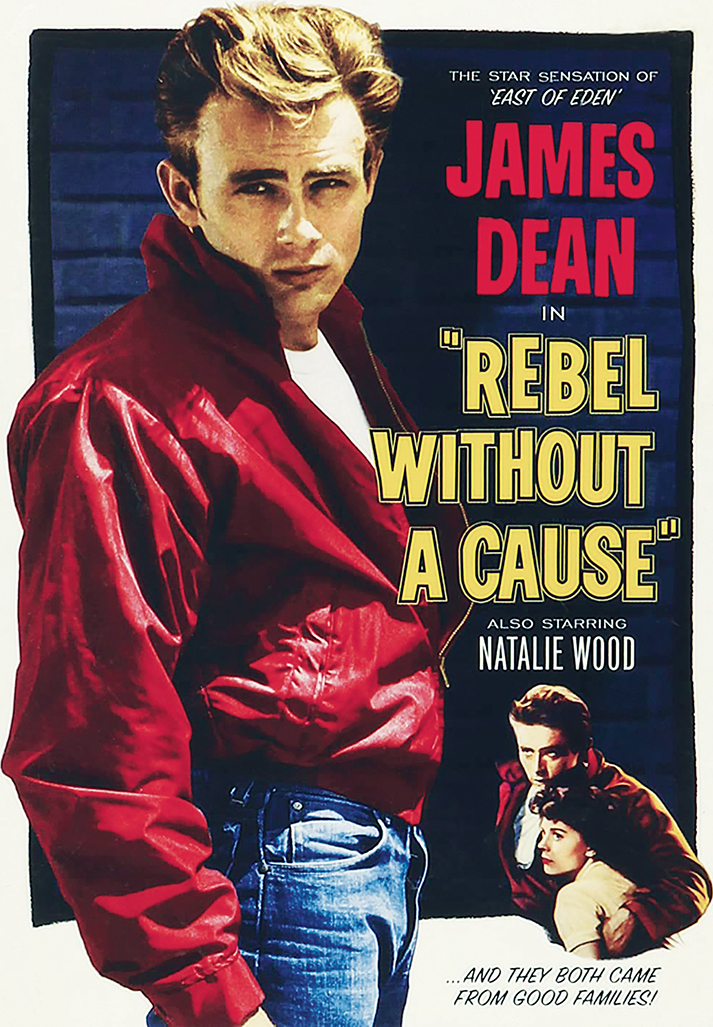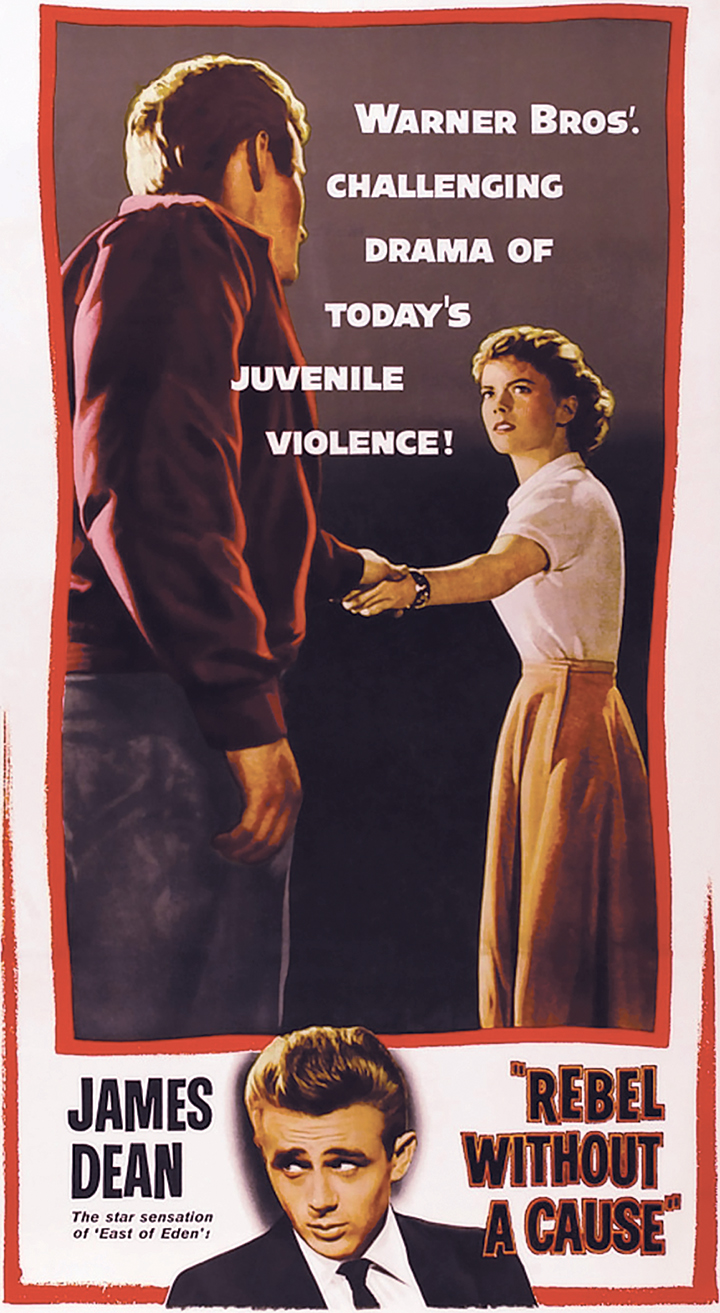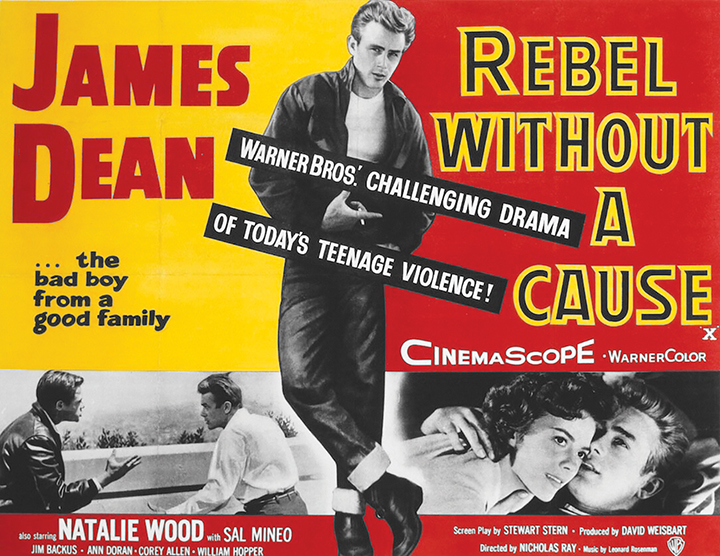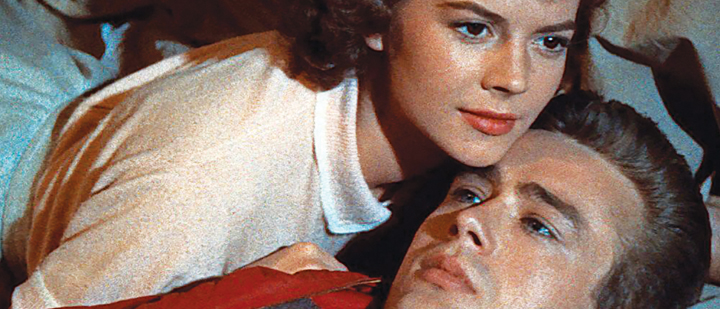
… and they came from good families!
By Mark Voger, author
‘Britmania: The British Invasion of the Sixties in Pop Culture’
Yeah, it was groundbreaking — possibly the first movie ever to tell the teenagers’ story from the teenagers’ point of view.
But it was 1955, and this was a big-studio Hollywood production. Thus, “Rebel Without a Cause” was, undeniably, a movie made by grownups and marketed to grownups. (The poster tagline “and they came from good families!” tells you who this movie is really talking to.)
Yeah, James Dean is magnetic. But don’t forget, the guy was canonized after his tragic death at age 24. (“Rebel” was released posthumously.)
Most of what Dean does as troubled newbie-in-town Jim Stark is still affecting and believable, but a few things are over the top. When this baby Brando bellows “You’re tearing me apart!” — usually the highlight of Dean’s clip reel — it comes off as demonstrative. And I could have done without the monkey toy hijinks under the opening credits.
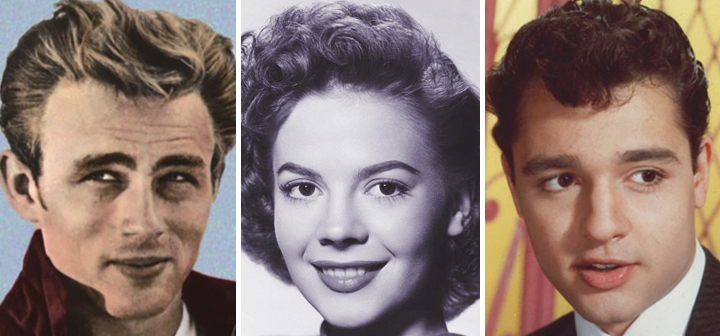
Setup: It’s a busy night at the precinct. Our three principles — Jim (Dean), Judy (Natalie Wood) and Plato (Sal Mineo) — happen to all be in police custody waiting for their parents, or at least their deputized parental figures, to collect them.
Their offenses vary wildly. Jim is drunk, belligerent and prone to violent outbursts. We get a peek into Judy’s warped home life when she tells a cop: “He called me a dirty tramp! My own father!” Plato’s offense is the worst of the three: He killed puppies. With a gun.
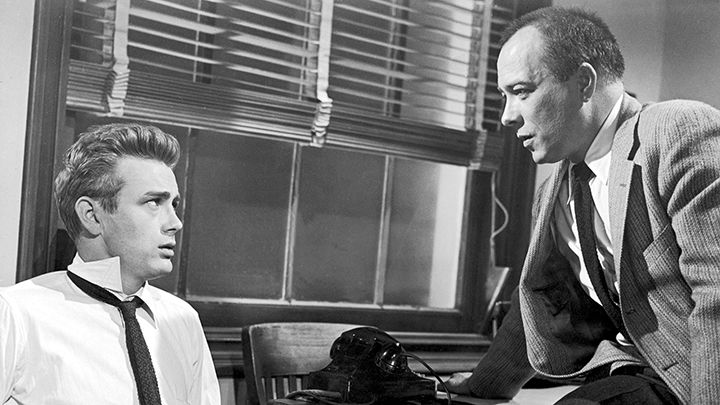
An officer (Edward Platt in an oddly dark dye job) dodges a punch from Jim, and then whips off his jacket to continue the fight if need be. (This is Platt’s John Wayne moment.) But the cop wants to help. He implores of Jim: “You wanna bug us ’til we lock you up. Why?”
Jim opens up to the officer, telling him he doesn’t want to end up like his own father.
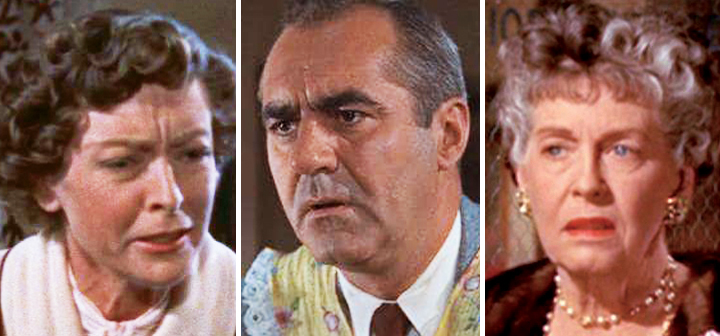
Then Jim’s parents materialize, dressed to the nines. (They look like they reek of cologne, cigarettes and booze.) These people of privilege put on quite a show. Exclaims Jim’s tone-deaf mother (Ann Doran): “They called us at the club, and I got the fright of my life!” Just in case, you know, there’s anyone around who doesn’t know that Mrs. Stark belongs to “the club.”
Jim’s father Frank (Mr. Magoo himself, Jim Backus) is of little help, while Jim’s stern-faced granny (Virginia Brissac) seeks to smooth the situation over. “We’re not going to have any more trouble,” she declares. “He was always a lovely boy.”
To which Jim retorts: “Grandmother, you tell one more lie and you’re gonna get turned to stone.”
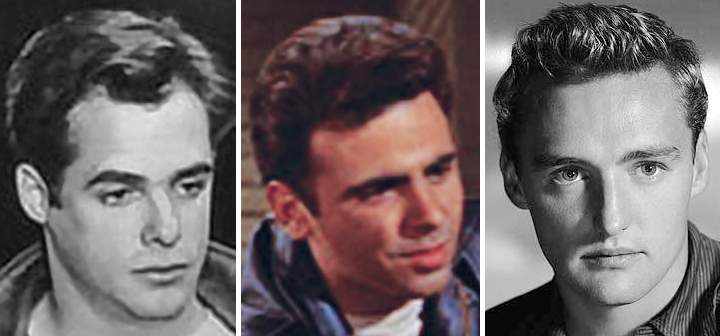
On the morning of Jim’s first day at Dawson High School, we learn that the Stark family has relocated from town to town, due to the social inconvenience of having a wayward son.
Jim offers to walk to school with Judy — what red-blooded boy wouldn’t? — but she makes plain her allegiance to her high school gang. In the rowdy, irreverent group are ringleader Buzz (Corey Allen) and his wing man Crunch (Frank Mazzola). Dennis Hopper and Nick Adams are wasted as woefully undeveloped background characters. They’re a rung above extras, really.
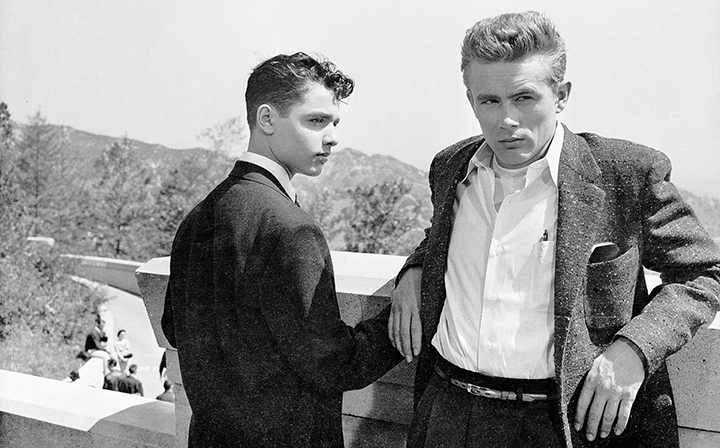
At school, we notice that Plato keeps a photo of hunky actor Alan Ladd in his locker, and can’t take his eyes off of new arrival Jim. It was bold indeed for a big-studio film to have an unambiguously gay character back in the caveman days of 1955.
Mineo, then 15, imbues Plato with remarkable sensitivity. To be honest, Mineo eventually steals the movie out from under (a generous and willing) Dean.
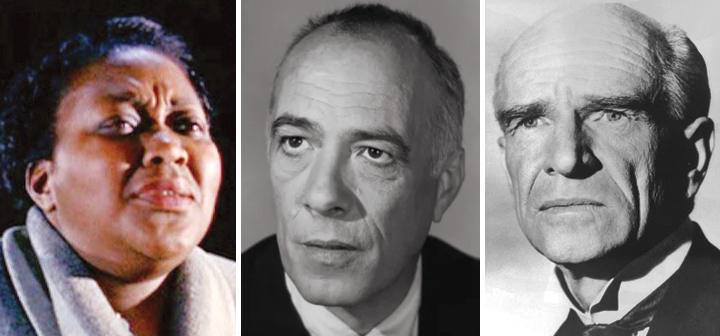
Their characters established, the students attend a class trip to Griffith Observatory (where, in real life, a bust of Dean now stands). A lecturer, Dr. Minton (IanWolfe), warns of the demise of the planet while narrating a science-themed animated film projected onto a massive domed ceiling with added special effects. (I remember seeing something like this at the Franklin Institute in Philly.) Minton’s words are clearly a metaphor for the “live fast, die young” attitude of Jim and his new frenemies.
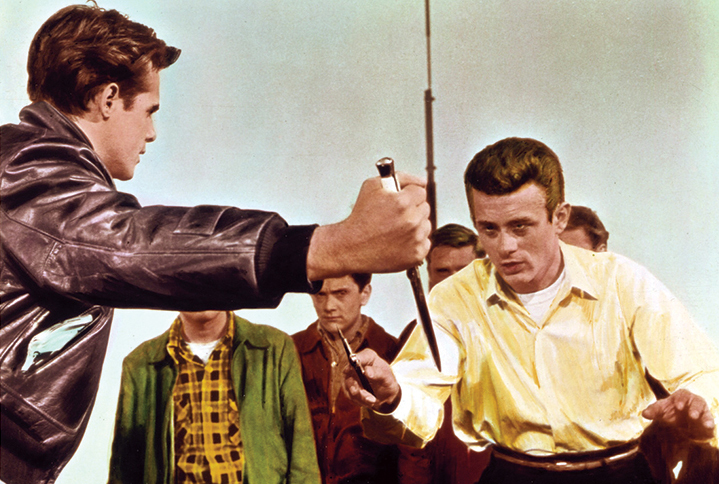
The gang puts Jim through a brutal hazing, starting with a knife fight between he and Buzz. Jim gives a good account of himself, shall we say, and is promptly challenged by Buzz to a “chicken run” after dark.
Does Buzz really have it in for Jim? When the two are alone briefly, Buzz admits to liking the newcomer. This makes us suddenly reappraise Buzz, even after the horrible things we’ve seen him do. And it makes what happens next feel like loss.
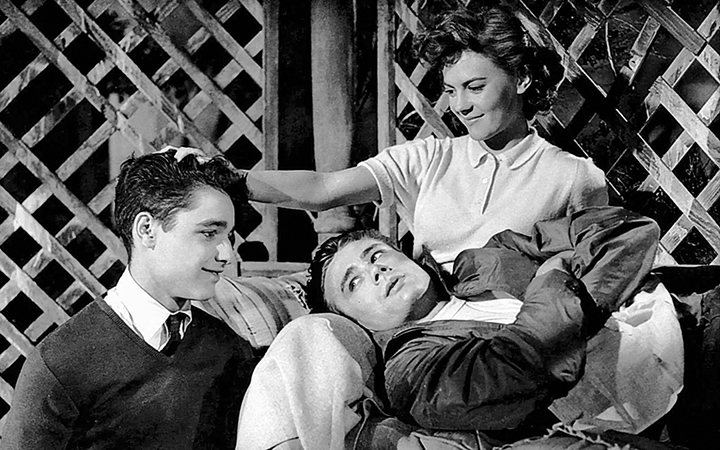
Later, Judy notices how kind and decent Jim has been to Plato, a nerdy outcast who is usually treated like a pariah at school. She notes with newfound admiration that Jim became Plato’s friend when he “didn’t have to.”
It’s little moments like these — Jim and Buzz’s brief bromance, and Jim’s delicacy with Plato — that make “Rebel” a classic, despite the sexiness of the knife fight, the chicken run, and all of those parental histrionics.
Behind the scenes
According to screenwriter Stewart Stern, Ray was among the first in Hollywood to recognize that by the 1950s, juvenile delinquents weren’t necessarily the product of “broken” homes or economic strife. “The kind of delinquency we were seeing among young people wasn’t restricted to what was then called the ‘ghetto,’” Stern said in the 2005 short film “Rebel Without a Cause: Defiant Innocents” (Warner Entertainment).
“There was a lot of restlessness among middle-class young people who were acting out in ways one would never expect. (Ray) realized this was a function of the family, not a function of an economic situation at all. It was their own rage at being raised by people whose values were old-fashioned to them, and the kind of parenting they were experiencing in the wake of World War II.”
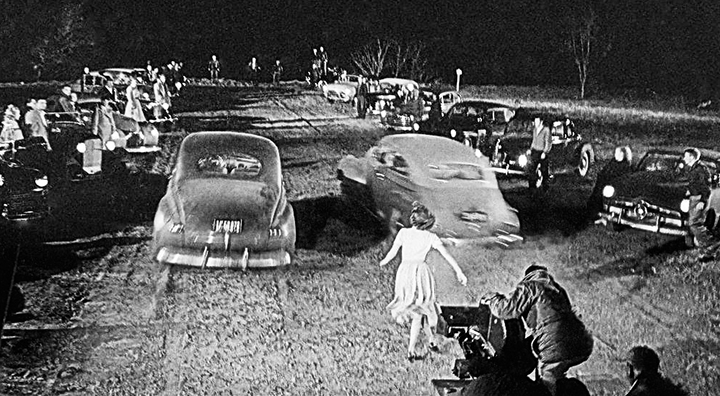
But convincing the suits at Warner was an uphill battle for Ray. He had read about a tunnel along Mulholland Drive that teens used for what were then called “chicken” or “blind” runs. That is, two cars speed toward one another; the winner stays on course; the loser swerves out of the way. (Only in Juvenile Delinquent Logic can the person who avoids a head-on collision be the “loser.”)
Inspired by the phenomenon, Ray wrote a 17-page treatment titled “The Blind Run.” This eventually morphed into “Rebel Without a Cause,” which was named after (but not inspired by) a 1944 book by psychologist Robert M. Lindner detailing the case study of a mentally ill man. The title was imposed by the studio, to Ray’s chagrin. (It’s all there in “Defiant Innocents.”)
The vehicles initially chosen for the chicken run were “cars that looked like they were something left over from the Dead End Kids, with rumble seats,” Mazzola said in the 2005 short film. It was Mazzola who suggested that Dean should drive a modified 1949 Mercury. Mazzola also choreographed the knife fight, which he based on a real-life experience.
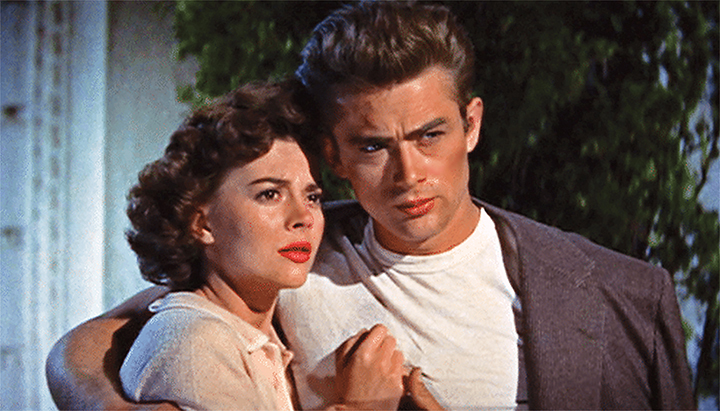
Ray was a visionary, but he was no angel. While filming “Rebel Without a Cause,” Ray was having an affair with Wood, who was then 16 to his 44. It’s all the more disturbing when you consider how passionately Wood campaigned for the role of Judy, as a way of breaking with her “child star” past.
There was a second victim of Ray’s terrible lapse in judgment. Hopper, then a rising actor, was initially in consideration for the meaty role of Crunch. Hopper was also Wood’s (age appropriate) boyfriend at the time. He did what a lot of 18-year-olds would do back then: challenge Ray to a fight. For this, Hopper was busted down to the role of Goon, which furnished him with exactly one line.
It’s nice that Marietta Canty had a showcase role, albeit as the family maid who is the only adult to care what happens to Plato, a virtual orphan whose parents checked out long ago. Canty played many a maid in her 15-year movie career. That’s the (regrettable) way things were. It’s just too bad the movie didn’t see fit to, at the least, bestow a name upon her character. “Rebel Without a Cause” was Canty’s final film.
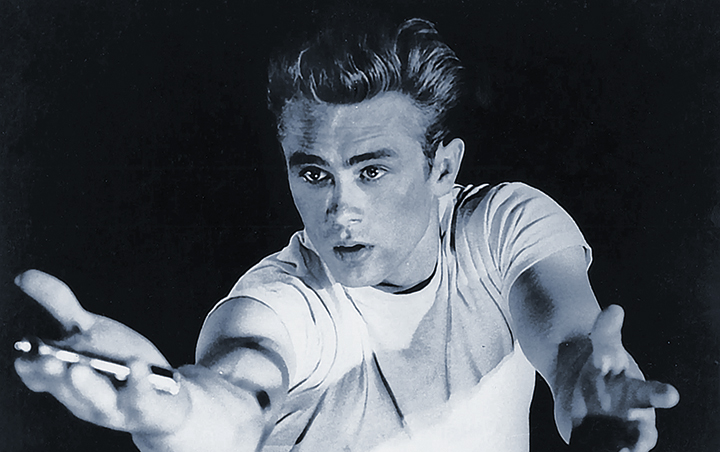
With its knife fight, chicken run, tough-talking punks and head-scratching coppers, “Rebel Without a Cause” left its indelible imprint on the JD (juvenile delinquent) movie genre of the 1950s. When you see Judy umpire the start of the chicken run, you realize this same scene was repeated in, oh, a half dozen movies since.
But there’s something “Rebel” doesn’t have that its low-budget imitators did: rock ‘n’ roll. There was nothing rebellious about Leonard Rosenman‘s score; it could have been at home in any number of “grownup” movies. (Heck, you could picture it in “To Kill a Mockingbird” or “Inherit the Wind” or even “Giant.”) But movies like “Drag Strip Girl” (1957) and “Hot Rod Gang” (1958) — they had kids hoppin’ to tinny guitars and squeaky saxophones.
In a morbid development, four young actors in “Rebel Without a Cause” died before their time. The first, of course, was Dean himself, who was killed in a car accident in 1955. Following this tragic event, the chicken-run sequence in “Rebel” took on extra significance.
The others were Adams, who died of a drug overdose at age 36 in 1968; Mineo, who died of a stabbing at age 37 in 1976; and Wood, who died in a (still unexplained) drowning at age 43 in 1981. Requiescant in pace.
‘REBEL WITHOUT A CAUSE’
James Dean as Jim; Natalie Wood as Judy; Sal Mineo as Plato; Jim Backus as Frank Stark; Ann Doran as Carol Stark; and Corey Allen as Buzz
Written by Stewart Stern from a story by Nicholas Ray
Music by Leonard Rosenman | Cinematography by Ernest Haller
Produced by David Weisbart | Directed by Nicholas Ray
[Warner Bros. Pictures]
VIDEOS
Disappointed in Thurston Howell III, Jim turns to the Chief of C.O.N.T.R.O.L. for a father figure.
His first day at a new school, and already, Jim sees something he likes.
Fatalisim is catching in this town.
